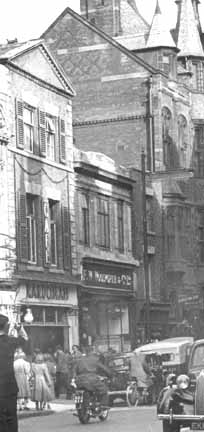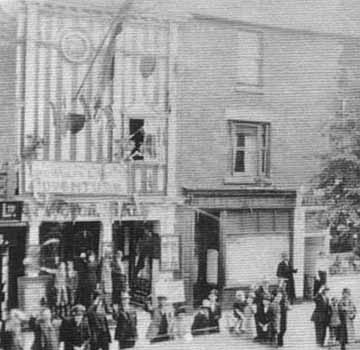 This is the last in the series. In this piece we touch on Chester's first cinema hall, the Eastgate Street Picturedrome. we also include the Foregate Street Glynn, the Sealand Road multiplex and some proposed cinemas that didn't materialise. This is the last in the series. In this piece we touch on Chester's first cinema hall, the Eastgate Street Picturedrome. we also include the Foregate Street Glynn, the Sealand Road multiplex and some proposed cinemas that didn't materialise.
The Picturedrome, described as "a popular picture playhouse" opened on 8 November 1909 as the Corn Exchange Cinema. It was run and managed by Will Hunter and his wife.
After a short period it became the Picturedrome. It was accessed via an alley running down the side of the offices of Dickson's Nurseries. Films were shown in the upper part of the building and the projector, which was hand cranked, was placed in the centre of the hall. Three months after opening, the equipment was placed in a fireproof box. This was because of the new cinematograph act.
The Picturedrome closed on 29 March 1924. Eventually it became a Woolworth store (long since closed- the current Woolie's, ironically, stands on the site of another demolished cinema in Foregate Street, the Classic). The site is now occupied by a branch of Next, whose architects, remarkably, restored the shop's frontage to pretty much how it had appeared in the 1920s.
Right: Eastgate Street in 1951. The Woolworth's store squashed between the Kardomah Cafe and B. Walton and Son Jewellers (which still exists) was the former home of the Picturedrome Cinema
The Glynn Picture Hall in Foregate Street (illustrated below) first opened its doors on 19th June 1911 with the film Sixtus the Fifth.
The deputy mayor, R. C. Davies opened the building. Mayor D. L Hewitt should have opened it, but was detained in London.
The 750-seat hall was run by the Glynn Animated Picture Company, formed by Glynn Hill and G.E. Bulford. The manager was Charles (Chas) Powell. Later, Fred Rowley became manager. He was transferred to the Gaumont Palace in Brook Street after the Glynn's closure, which had opened a few months earlier.
The cinema was first known as the Glynn Picture Hall and later as the Glynn Picture House. An orchestra known as the Hillman and the Glynn accompanied the flickering images.
With the building having a corrugated tin roof, I should imagine that some further, very loud sound effects must have been produced during a hail storm...
The hall had seating for 750 and was also the head office of the company. Their other cinemas were the Central Shrewsbury and the Glynn Wrexham.
In 1923 W E and J Taplin ran the hall. 1928 saw General Theatres take over.

In its day, the Glynn was described as "A High Class Entertainment of Animated Pictures". Nontheless, owners Gaumont British closed it on 5 September 1931 with the film Lure of the South Seas.
The old cinema's Tudor-style frontage still remains with us today. After closure the building was used for several things including a fruit and veg market, Austin Huxley's, a car show room and the House of Holland. The interior was gutted by fire when it was a 'Why' store. It was re-built, becoming Edward's Bar, followed by the Foregate Bar.
When last we looked, the old cinema was trading as something called the Revolution Bar.
Left: The Glynne Picture Hall in Foregate Street sometime during the 1920s
"I do not remember the Glynne, as it was before my time, but my mother-in-law Lily remembers it well. The Glynne picture house was made into a fruit and vegetable market. She can remember getting 20 oranges for 6d, 2d of pot herbs- which consisted of three carrots and an onion with a stick of celery- 1lb of bacon was 6d and a rabbit 9d". Dorothy Carline, Chester Standard 1998
The six-screen multiplex on Sealand Road described as 'The Cinema of Tomorrow- Today', opened on 18 December 1990. Opening attractions included Ghost (ironically, the final film to have been shown at the old Regal in Foregate Street before it was closed down the same year) and Home Alone.
 The first manager was Julie Caden. She was the first woman to manage a multiplex in England. The complex housed 1600 seats and opened as the Cannon. Later it became the MGM followed by Virgin. Finally it was the UGC- until, in 2013, together with the popular bowling alley next door, it was demolished to make way for an Asda store, due to open in October 2014. This marked the end for cinema in Chester. Now the aspiring cinema goer is forced to drive the few miles to the American mall-style Cheshire Oaks development near Ellesmere Port. The first manager was Julie Caden. She was the first woman to manage a multiplex in England. The complex housed 1600 seats and opened as the Cannon. Later it became the MGM followed by Virgin. Finally it was the UGC- until, in 2013, together with the popular bowling alley next door, it was demolished to make way for an Asda store, due to open in October 2014. This marked the end for cinema in Chester. Now the aspiring cinema goer is forced to drive the few miles to the American mall-style Cheshire Oaks development near Ellesmere Port.
Four further cinemas in Chester were planned but none came to fruition. In 1921, shares were offered for a proposed Scala Cinema in Frodsham Street. This was to be built on the site of the Hop Pole Hotel (actually 13 Foregate Street).
A cinema was also planned to be built in Hoole, near Lightfoot Street (more information about this would be welcome).
On Christleton Road, Boughton, a fine new cinema was built, but never actually opened as one! Its intended opening in September 1939 was delayed by the emergency closing of all places of entertainment due to the outbreak of war, in anticipation of expected air raids. Three weeks later, when these failed to occur, they were allowed to re-open but, by that time, the building had already been leased 'for the duration' (of the war) as a store and it never became a cinema.
The building (illustrated right) has been occupied by a variety of businesses over the years, including Philips Auctioneers and Block Busters Video. Until recently it housed Bonham's Auctioneers.
Go on to see how Chester's cinemas advertised in the local press...
These articles about the history of the Chester cinema first appeared, in their original, short form in the Chester Standard in January and February 2003. We aim to add much more information to this site- our own reminisciences and contributions are most welcome- write to us!
|
 This is the last in the series. In this piece we touch on Chester's first cinema hall, the Eastgate Street Picturedrome. we also include the Foregate Street Glynn, the Sealand Road multiplex and some proposed cinemas that didn't materialise.
This is the last in the series. In this piece we touch on Chester's first cinema hall, the Eastgate Street Picturedrome. we also include the Foregate Street Glynn, the Sealand Road multiplex and some proposed cinemas that didn't materialise.
 The first manager was Julie Caden. She was the first woman to manage a multiplex in England. The complex housed 1600 seats and opened as the Cannon. Later it became the MGM followed by Virgin. Finally it was the UGC- until, in 2013, together with the popular bowling alley next door, it was demolished to make way for an Asda store, due to open in October 2014. This marked the end for cinema in Chester. Now the aspiring cinema goer is forced to drive the few miles to the American mall-style Cheshire Oaks development near Ellesmere Port.
The first manager was Julie Caden. She was the first woman to manage a multiplex in England. The complex housed 1600 seats and opened as the Cannon. Later it became the MGM followed by Virgin. Finally it was the UGC- until, in 2013, together with the popular bowling alley next door, it was demolished to make way for an Asda store, due to open in October 2014. This marked the end for cinema in Chester. Now the aspiring cinema goer is forced to drive the few miles to the American mall-style Cheshire Oaks development near Ellesmere Port.